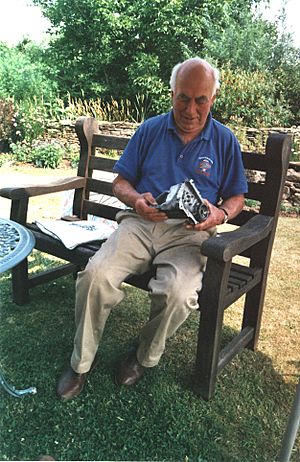Peter Olver (RAF officer) facts for kids
Quick facts for kids
Peter Olver
|
|
|---|---|
| Born | 4 April 1917 Royal Leamington Spa, England |
| Died | 14 February 2013 (aged 95) Wiltshire |
| Allegiance | |
| Service/ |
|
| Years of service | 1938-1945 |
| Rank | Wing Commander |
| Unit | No. 611 Squadron RAF No. 603 Squadron RAF No. 66 Squadron RAF No. 238 Squadron RAF No. 213 Squadron RAF 1 Squadron SAAF |
| Battles/wars | World War II |
| Awards | Distinguished Flying Cross |
Peter Olver (born April 4, 1917, died February 14, 2013) was a brave British pilot during World War II. He was a Wing Commander in the Royal Air Force and a famous "fighter ace." This means he shot down many enemy planes. He even fought in the important Battle of Britain, flying a fast Supermarine Spitfire plane. He was awarded the Distinguished Flying Cross (DFC) for his bravery.
Peter Olver's Early Life and War Heroics
Peter Olver was born in Royal Leamington Spa, Warwickshire, England. He joined the RAF Volunteer Reserve and trained to become a pilot. In September 1940, he joined No. 611 Squadron RAF as a Pilot Officer, which is a starting rank for pilots.
Soon after, he moved to No. 603 Squadron RAF. On October 25, 1940, during his first mission, his Spitfire plane was attacked by a German Messerschmitt Bf 109. He had to parachute out of his plane and was hurt when he landed.
Luckily, he recovered quickly. After getting his first "kill" (shooting down an enemy plane), he joined No. 66 Squadron RAF. With this squadron, he shot down at least three more enemy aircraft.
Later, Peter Olver was sent to North Africa. There, he became the leader of No. 238 Squadron RAF and No. 213 Squadron RAF. He flew Hawker Hurricane planes and destroyed three Italian biplane fighters while they were on the ground.
He was given the DFC award for his courage. He then took command of 1 Squadron SAAF, flying MK V Spitfires. He destroyed an Italian Macchi C.202 fighter plane. He was promoted to Wing Commander after the previous commander was killed.
During the Allied invasion of Sicily, he shot down another Bf 109. However, he was then attacked himself and had to crash-land his plane. He spent the rest of the war as a Prisoner of War (PoW) in camps, including Stalag Luft III.
Life After the War
After the war ended, Peter Olver married an officer from the Women's Auxiliary Air Force. He left the Royal Air Force and became a farmer in Kenya.
When Kenya became an independent country, he moved back to the United Kingdom. He continued farming in Devon and Wiltshire. Peter Olver had four sons. He passed away on February 14, 2013.
 | Leon Lynch |
 | Milton P. Webster |
 | Ferdinand Smith |


